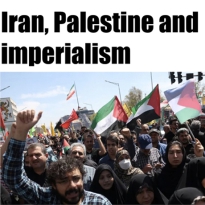Features
You are here
If we fight, we can beat austerity

October 5, 2012
Five years into the economic crisis, the 1% continues to impose austerity measures to make ordinary people pay. While not resisting will guarantee more austerity, we are starting to see a number of significant victories based on rank-and-file organizing.
Quebec: “Together, let’s stop the hike.”
Quebec students showed that we can stop austerity measures, if we build resistance from below. Threatened with a 75 per cent tuition hike, students mobilized all those opposed to the tuition hike within a broader argument against austerity. The CLASSE student union did not suddenly call a strike from on high, but built it patiently from below—starting with mass petitions, demonstrations and protests. Through the process of organizing department by department and campus by campus, the movement built rank-and-file confidence and experience necessary to organize and enforce a strike.
For six months students went on strike, resisting media vilification, police violence, and government attempts to divide them at the negotiating table. The student movement built alliances with the environmental movement and labour movement—with CLASSE moving their congress to Alma during the day of action to support locked out workers, and calling for the student strike to broaden into a social strike.
When the government responded with draconian law 78—banning gatherings of 50 people or more—the student movement appealed to all those affected, whether students or not, to defend civil liberties. Casserole demonstrations erupted—effectively breaking the law with the largest act of civil disobedience in Canadian history—and solidarity demonstrations spread across Canada and around the world.
In a final attempt to break the movement Premier Charest called an election, with the result that his government was toppled and he lost his own seat. The mass pressure from below pushed the new PQ government (which has a history of tuition hikes and called for complying with Bill 78) to abolish both the tuition hike and the law meant to enforce it.
Chicago teachers: rank-and-file organizing
Similarly, Chicago teachers showed how the labour movement can fight austerity through rank-and-file organizing and community outreach. Threatened with the corporatization of education—with merit pay, heavy reliance on test scores, and easy firings—the Chicago Teachers Union (CTU) organized a strike in difficult circumstances. They took on powerful Democratic mayor Rahm Emanuel in the midst of the US presidential elections with no support from Democrats, and resisting austerity measures that the national affiliate—the American Federation of Teachers—had not fought.
Earlier in the year, the Caucus of Rank-and-File Educators (CORE) organized against school closures alongside parents and students. Though the fight to stop closures was unsuccessful, the experience of rank-and-file organizing cemented relationships with the broader community and won over teachers, allowing CORE to run a slate against the previous union leadership and win.
The vision of fighting for quality public education—including conditions for teachers and students—was clearly articulated in the CTU document The Schools Chicago’s Students Deserve, and supported by the 90 per cent strike vote. The strike was organized school by school, alongside visible mass rallies uniting with parents and students, and driven from below. The leadership remained bound by the “House of Delegates” drawn from each school, so when the bargaining team recommended the deal the House of Delegates voted to continue the strike until they had a chance to consult all the members about the details.
As the CTU wrote in a statement to supporters following the strike:
“What has been accomplished in Chicago in the last few weeks has reverberated nationally. It powerfully demonstrated an alternative to business unionism and the whole corporate education agenda. There are new solidarities, forged on picket lines, among teachers and between teachers and students, parents, and community members. Through this strike, teachers have emerged as activists and organizers, and there is a deeper consciousness about the system we are confronting…We are so much stronger due to the strength and unity of the CTU and the outpouring of public support.”
CAW: concessions without a fight
By contrast, the recent auto worker’s contract shows what happens when we don’t resist austerity. Following the pattern seen elsewhere, the employers demanded massive concessions despite returns to profitability. Ford, GM and Chrysler all demanded similar concession to those that the UAW accepted in the US, which drastically lowered wages for new hires.
The CAW leadership heavily pushed the four-year deal, claiming it will save jobs and create new ones. But 20 years of concessions have not saved jobs despite promises from the big three. The only guarantee is that wages will be frozen for current employees, and tiered for new hires—starting at 60 per cent wages (lower than the non-union Toyota plant in Cambridge) and taking a decade to reach the full rate, a permanent set-back in wages.
The problem with the agreement isn’t just that it contains deep concessions, which it does. The real problem is that the union leadership accepted the concessions with next to no fight. By settling with Ford, GM and Chrysler without a fight, employers everywhere will be emboldened and other workers will be demoralized.
When unions fight – even in difficult situations like against US Steel and Vale Inco – they send a message to employers that workers will fight them every step of the way. As a result, these unions have built even stronger rank-and-file networks and are equipped with lessons learned to apply for the next round. And when Rio Tinto workers were locked out last year, rank and file organizing beat back major employer concessions.
The lesson for CAW and CEP members of a future merged union is clear: it’s not the size of the union that’s decisive—it’s rank-and-file organization. And that work needs to start now.
Section:
- Log in to post comments










